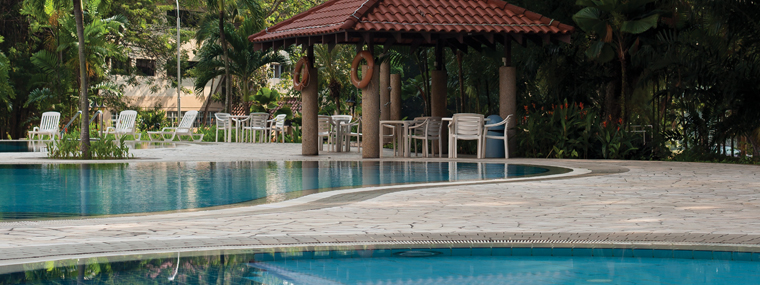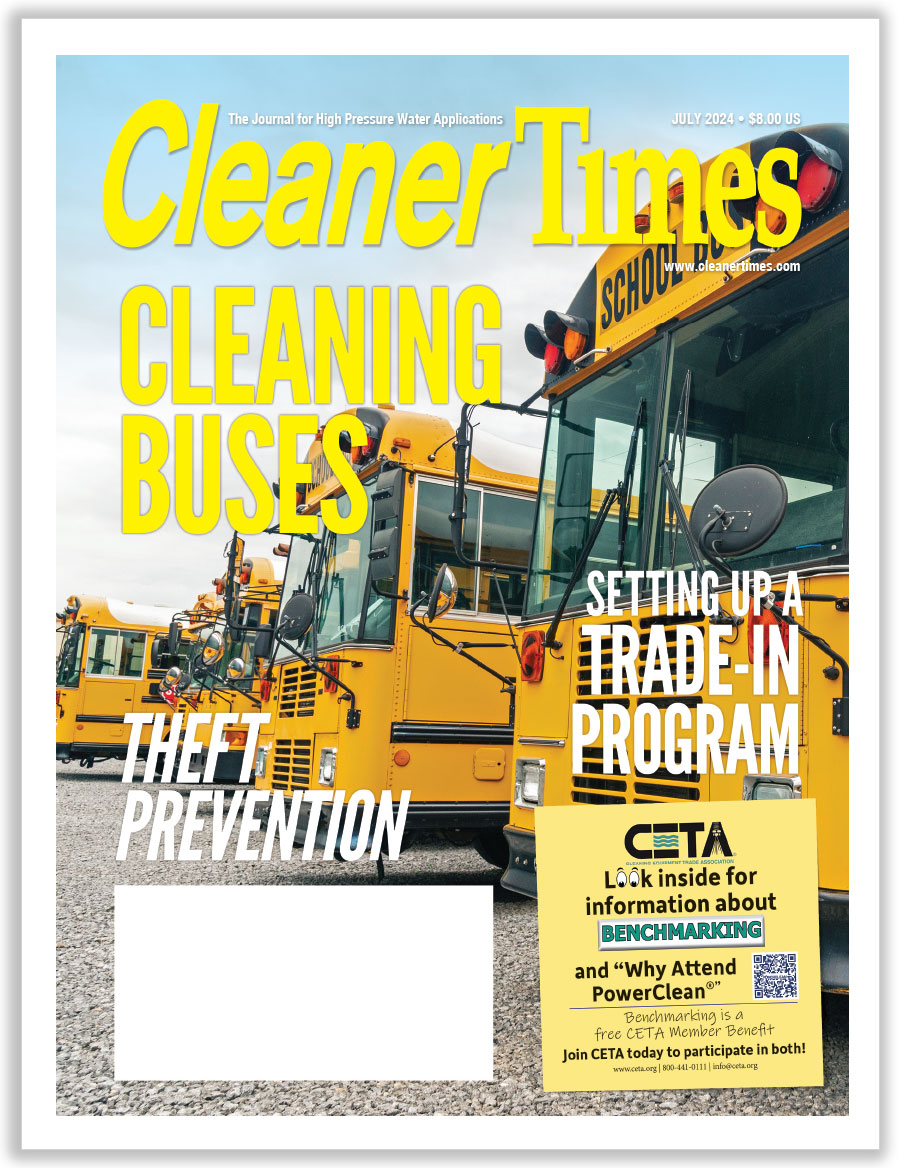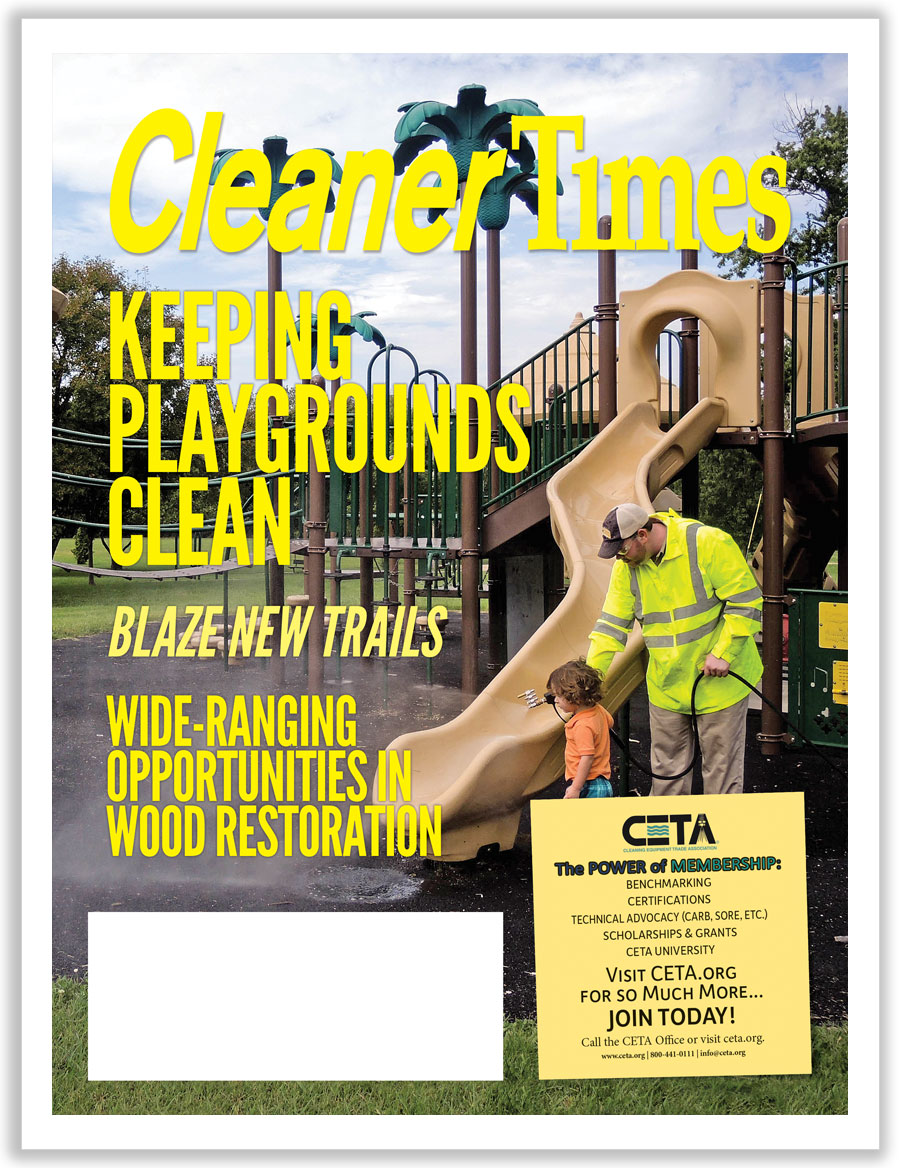
2023 Power Washers Guidebook Update
Cleaning Pool Decks & Patio Furniture
By Terri Perrin / Published May 2023
Contributor: Dan Krueger, Xtreme Power Wash Solutions, Phoenix, AZ

G
eographical Considerations
When we think about in-ground residential pools in the U.S., most of us would consider California or Florida as the top spots for power washing opportunities. While this would be correct, it’s important to note that according to P.K. Data Research, there are five million in-ground residential swimming pools in the U.S., and only 40 percent of them are in those two states. Other states have high concentrations of pools, too.
P.K. Data Research also noted that if the corridor from Boston to Washington, D.C., was a state, it would be the third most “pool-populous,” with just under eight percent of the nation’s in-ground pools, followed closely by Texas and Arizona. No other states come close, but there are surprising concentrations of pools in the upper Midwest near Chicago, Cincinnati, Cleveland, and Detroit. And who would have guessed that Cleveland, OH, has the largest number of pools per capita, with 10.7 swimming pools per 100,000 residents?
According to pool industry reports, COVID-19 pandemic restrictions (2020–2022) combined with several summers of recurring heatwaves have driven unprecedented waves of demand from homeowners looking to build a backyard oasis with a pool. This trend is even being seen in Canada, where the highest concentrations of in-ground residential pools are in the provinces of Ontario, Quebec, British Columbia, and Manitoba.
So, even if you do not live in a traditional “sunshine state” (or province), there may be excellent opportunities to expand your service offerings to include power washing pool decks and patio furniture in your geographical region, too.
Be aware that standards organizations, such as ANSI (American National Standards Institute), offer prescriptions for pool deck cleaning, including a specific standard for in-ground residential pools. Many municipal and private pool owners establish their own standards. Anyone cleaning pool decks will want to get a copy of all relevant standards and use them as definitive guides. Environmental regulations vary from state to state and county by county. Be sure you know the rules in your region, and keep well informed of any changes.
Typical Job
First, we must clarify that we are addressing pool decks in this article, not your standard wood or composite decks. Pool decks are typically made of concrete, sandstone, or tile, while some may have wood, manufactured planking, other materials as accents, or any combination thereof. There is a huge difference in how you set up for and manage pool deck and patio furniture cleaning, largely due to the fact that you have to be mindful of not contaminating the pool water.
Every job must begin with a thorough inspection of the area to be cleaned. Evaluate the condition of the pool deck, being mindful that some deck materials may be more fragile than others. Take time to inspect both the pool decks and the furniture when you are doing your on-site estimate.
Make a physical note of the condition of all surfaces and any potential problem areas. Are there any loose tiles? Major cracks in the concrete? Rotted or splintered wooden planks? Take photographs of any areas of concern to use as a future reference, for possible “before and after” advertising and/or testimonials, and to provide proof of the state of the pool deck and furniture to your client in writing prior to commencing work.
Generally speaking, you can expect that commercial customers will be regular or semi-regular clients, calling you to clean their pool decks several times a year as part of their maintenance schedule. Residential customers, on the other hand, are most likely to call the contractor when they notice a buildup of residue on their pool decks or patio furniture.
A lot of companies want their service provider to get in, clean, and go—in other words, to do the job as quickly as possible. To get quality results, however, it is important to take the time needed to do a thorough job. Be sure to explain this to your customers. For commercial customers, you may need to be flexible and provide the option of cleaning during their less busy times of the week or day.
Techniques That Work Best For Decks
Wet pool decks are slippery, so anti-slip footwear should be worn at all times. And remember that the “no running” rule applies to contractors as well as pool users! To ensure that the pool water is not contaminated during the power washing process, you have to be hyper vigilant about your use of chemicals and management of wastewater runoff. The pool’s water pumps, filtration systems, and many other components can be irreparably damaged if wastewater is not properly captured and disposed of.
After your on-site written quote is prepared and accepted, a typical pool deck cleaning contract includes the following:
- Testing the pool water
- Removing all furniture and decorative items from the deck area
- Protecting plants, statuary, grills, and other built-in features
- Using a leaf blower to remove all loose debris
- Proceeding with power washing.
Note that Step #4, blowing away debris, is just as important as power washing. In the hotter states there may be dust storms, forest fire smoke/ash, leaf litter, and other organic matter that can coat any substrate with debris. If a pool deck is not blown clean prior to cleaning, the pressure water will create mud and splatter the dirt everywhere.
In some states, such as Florida, mold and mildew grow readily on tile and can be a big concern. A chemical application may be needed to inhibit growth following washing.
A concrete pool deck can be cleaned with cold water at 3,500 to 4,000 psi. With a hot water machine the same results can be obtained with lower pressure in the 3,200– to 3,500–psi range.
A solution of 8:1 water to chlorine ratio and pressure will be sufficient to wash most pool decks. Dan Krueger recommends Front 9 Restoration products. “These products allow us to remove oil/grease, rust, hard water (calcium), fertilizer stains, and more from most pool deck surfaces,” he says. “They are formulated to provide a wide variety of cleaning options and are environmentally friendly when used properly. Use a 45-degree nozzle at a 20-degree angle at about four to six inches from the surface. Just as important as the pressure to use on a pool deck is the rate of water flow; the option of getting up to eight gpm should be available, and the additional volume aids in rinsing. F9 Double Eagle (DE) and hot water will aid in sanitizing surfaces because it has an elevated pH. This, combined with hot water above 150ºF, will provide sanitation to most surfaces. Chlorine has limitations when it comes to removing heavy oils such as barbeque grease/smoke, tanning lotion, and food and drink spills.”
Techniques That Work Best For Patio Furniture
Patio and pool deck furniture are often made of more than one material, such as PVC (polymer of vinyl chloride), natural or synthetic wicker/rattan, metal, wood, and fabric. Know the components of the patio furniture before choosing a cleaning method. A citrus-based degreaser, such as Zep®, provides a wide latitude for cleaning without the risk of staining most materials.
- Place the patio furniture on a flat surface and spray away from the home’s windows and doors and the pool area.
- Hand-scrubbing of stains with a small brush and spot cleaning may be needed before cleaning the entire furniture piece.
- Use low water pressure, 1,000 psi or less, and hot water with diluted Dawn dish soap.
- Use a low-pressure spray with a 25- or 40-degree nozzle.
- Usually no detergent is required, but if it is really dirty, use detergent on the plastic or harder surfaces of the furniture.
- Rinse and flush away with low-pressure spray.
- Use a higher pressure/turbo nozzle for tables or iron furniture.
Exceptions
Hot water and high psi are always best for grease and oil stains, such as those that may be found in a barbecue area. However, pressure washers cannot be used at all in certain instances. For older pool decks that are deteriorating rapidly, for example, a scrub brush or plastic broom must be used.
Using a surface cleaner with a by-pass valve, pressure gauge, and temperature gauge will allow you to adjust the pressure as needed to clean areas that have delamination to the surface. This also allows softer surfaces such as exposed aggregate, CoolDeck® (a product that helps reduce heat absorption of surfaces by up to 35 percent), flagstone, and some granite to be cleaned without damage. The same can be done using a wand with the soap/by-pass valve; this can be used when you have an area with multiple materials, such as wood, Trex deck (a composite product), or stucco. F9 DE or Dawn soap and heat work well on these surfaces. If the wood is not stained, stripping (oxalic acid wash) and restaining are recommended. The same applies to older furniture. Do not use chlorine-based products on wood.
Equipment and Supplies
Investing in more than one pressure washer gives a contractor a range of tools to deploy as well as options for pressure, flow, and water temperature that can be matched to the substrate being cleaned. An 11-hp hot water pressure washer and a 23-hp cold water model, with two guns (each capable of 4-gpm), provide plenty of good cleaning options.
Brushes, buckets, and other tools will be needed for manual cleaning. It is very important that you carry (and use!) a pool chemical test kit to check and verify the condition (pH) of the pool water prior to and after cleaning.
Wastewater collection is a must at an increasing number of customer sites, and all power washing contractors
should have a system ready to use. Also, be prepared to invest in wastewater recycling equipment, which will likely become a must on most sites in the future.
Contractors also need the standard array of PPE (personal protective equipment), especially slip-proof footwear. For commercial jobs, signage to warn passersby of the “Wet Floor/Piso Mojado!” will also be needed.
How To Bill
Quote a pool deck by the square foot but not over the phone. It is imperative that you visit the prospective job site in person.
Some commercial clients insist on specific cleaning methods and may request bids from multiple contractors. Once you have established a working relationship with a commercial property, however, chances are good that they will hire you back for subsequent jobs without having to repeatedly bid and compete for the job.
Residential customers like to get a package for a fixed amount, particularly with spring cleaning. Consider creating a package of three services for one price, and you will please many customers in the process. Take several options, such as sidewalks, driveways, patios, garage floors, furniture, and pool decks, and offer your customer the choice of any three, up to a certain square footage, for one price.
Ancillaries
“Upselling” is one way to increase your profits on any job site. When working up your estimate, be on the lookout for value-added services you could perform for the customer. This includes, for example:
- Patio furniture, especially when called to estimate a pool deck cleaning
- Any flat surface adjacent to a pool deck, such as a parking area, side-walk, or patio—especially if it is made of the same material (for example, all concrete or tile)
- Patio paver cleaning, sanding, and sealing
- Tennis or pickle ball courts (or other sports areas)
- Pergolas, gazebos, and awnings.
Problems To Avoid
Understand the composition and evaluate the condition of a pool deck and patio furniture before beginning the job.
Avoid getting chlorine on furniture fabric—chair seats, table umbrellas, decorative pillows, etc. Chlorine bleach can cause instant discoloration and fabric rot, permanently damaging most fabrics.
Not getting chemicals in the pool is vitally important. Test the pool water before a job begins and after you are finished to document that the condition of the water has not changed. Pool water pH will have to be rebalanced if any chlorine from cleanup seeps into the water. Protect plants, which could be damaged from chlorine and even from cleaners with organic ingredients.
How To Fix Mistakes
If something goes wrong, fix it.
If it is necessary to return to a site several times to get it right, do it.
It takes time to get a job done correctly. Do not watch the clock. Focus on the job at hand.
Consider offering 24/7 emergency cleaning services. By being able to step in and respond to a mishap, such as a spill of food, tipped planter, or a child’s prank on a pool deck at a commercial site, contractors build strong ties. A willingness to fix the mistakes of others can be good for business and pool users.
Dan Krueger is the owner of Xtreme Power Wash Solutions, based in Phoenix, AZ. His team of fully licensed and insured technicians has over 30 years of experience in the commercial and industrial cleaning industry. They have the expertise to offer a wide range of solutions for business and home and are committed to providing honest, fair, and professional service. Dan is a member of the Power Washers of North America.








